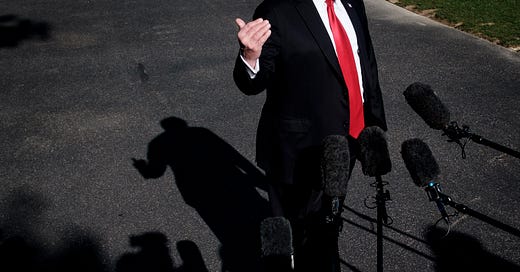
This Is How Trump Is Going to Meddle In the 2020 Democratic Primary
There's going to be some scorched earth.
Even though he was nominally busy in Japan, President Trump found time over the weekend to take shots at Democratic frontrunner Joe Biden. Rather than dunking on Biden’s public handsiness or challenging his claim to the mantle of America’s blue-collar champion, however, Trump went after Biden's stewardship of the Violent Crime Control and Law Enforcement Act, a 1994 measure eventually signed by President Bill Clinton that increased federal funding for law enforcement nationwide.


To the degree that a Trump tweet can still raise eyebrows, this one did. After all, there was no fiercer citizen advocate in the early '90s for cracking down on crime than Donald Trump, who infamously took out full-page ads in several newspapers calling on New York to “Bring back the death penalty! Bring back our police!” during the 1989 case of the Central Park Five, who were falsely convicted of attacking and raping a jogger.
That Trump’s a colossal hypocrite is not exactly new news. What’s interesting here is the way that he is now bringing the tactics that won him the 2016 Republican primary into the 2020 Democratic primary—a contest in which he'll play an enormous role without even participating.
Trump and Biden have actually followed very similar paths on criminal justice: advocates of strong enforcement in the '90s who have evolved away from mass incarceration and stringent sentencing in the last few years. Biden, for his part, followed the Democratic party as it gradually moved away from Clinton-era support of law-and-order policies through the Obama era to the present day.
This year, Biden has struck an uneasy balance between suggesting that he had been wrong to support the 1994 crime bill and insisting it wasn’t as bad as critics say: “I haven’t always been right, I know we haven’t always done things the right way, but I’ve always tried,” he said at a Martin Luther King Jr. Day breakfast in January. He then added: “The idea that the crime bill generated mass incarceration, it did not generate mass incarceration.”
Trump’s move to support criminal justice reform, on the other hand, has been both recent and sudden, in keeping with his we’ve-always-been-at-war-with-Eastasia style. When he was running for president, restoring law and order to a lawless America was a common refrain; during his inaugural address, he railed against the “American carnage” of impoverished inner cities and the “crime and gangs and drugs that have stolen too many lives and robbed our country of so much unrealized potential.” At some point, however, Trump’s focus shifted: He still talks about these things with regard to immigrant crime, but less so with that committed by U.S. citizens.
Of course, going from “Make America Great Again” in 2016 to “Keep America Great” in 2020 requires a shift in the language used to describe America. But there’s also plenty of reason to believe Trump has simply come around naturally on the issue of Americans given unjustly onerous sentences for relatively insignificant crimes (thanks in great part to the lobbying of, of all people, Kim Kardashian West).
All of this is to say that Trump would have every incentive, under ordinary political circumstances, to defend Biden from attacks about the 1994 crime bill—attacks that, until this weekend, had been lodged by other 2020 Democrats, from Kamala Harris to Bill de Blasio. It’s the crazy radical progressives, he might have said, who want to prioritize the comfort of felons over that of law-abiding, who want to demonize our police, who want to take us back to the dark ages of the crime-sodden '70s and '80s. That was the backhanded tone he struck last month, when Biden first entered the race: Joe’s a moron, of course, but at least he’s not evil!

But Trump’s abandoned that tactic now that Biden is surging in the polls. You can’t become frontrunner without Trump painting a target on your back.
This was always the greatest strategic difference between Trump and his bundle of foes during the 2016 Republican primary. Each of them had his or her carefully cultivated political brand that defined natural enemies: establishment types against Tea Partiers, restrained blue-state governors against celebrity legislators; Chamber of Commerce mainstays against Bible Belters. When Trump came out of nowhere to take a commanding lead in the field, nobody seemed able to audible away from those strategies, opting instead to keep digging away at their chosen opponent and hope the Trump bubble would pop on its own.
Trump’s political strategy, meanwhile, was incredibly straightforward: At any given moment, he was attacking whichever candidate seemed strongest. Summer 2015, when Jeb Bush seemed like he had the inside track? Punch—Jeb’s a low-energy establishment loser. Late 2015, when Ben Carson was surging? Punch—Carson’s totally incapable of governing and probably mentally unstable. Early 2016, by which point Ted Cruz was pretty much the last other guy with a heartbeat? Ted’s the biggest liar you ever met, a maniac, incapable of making deals and getting things done, his dad probably helped kill JFK, punch, punch, punch.
We already know the Democratic royal rumble is likely to prove brutal with 24 contenders and counting in the ring and the desperate desire to depose Trump as soon as possible stressing everybody out. Now throw Trump himself into that mix, and realize that he’s likely to treat this cycle like Russia treated the last one: trolling and rabble-rousing online, throwing daily Twitter bombs at candidates he thinks he can damage, and just generally multiplying the chaos by any means possible.
It’s going to be a long 18 months.











